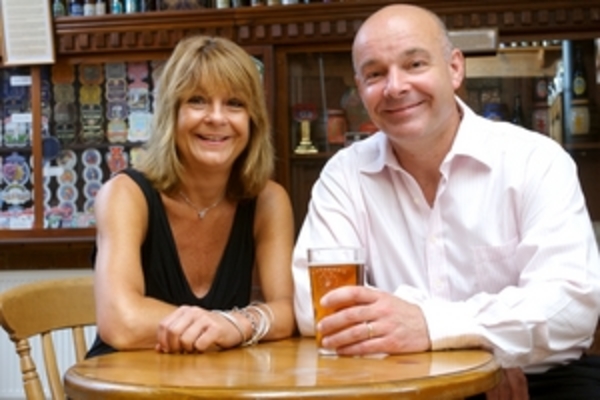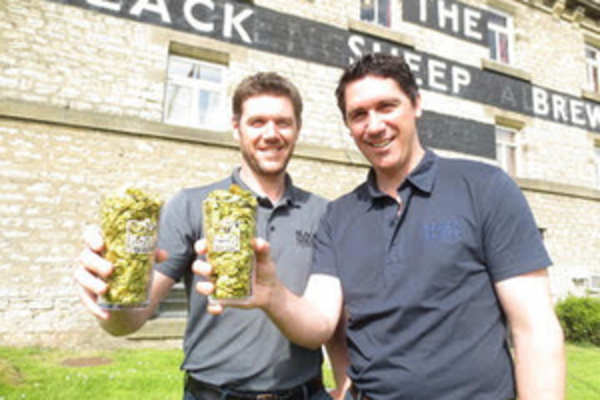Brewers bullish about cask beer revival
Added: Thursday, January 20th 2022

Is cask beer facing terminal decline? Figures compiled by the British Beer & Pub Association are stark and alarming. Since the end of lockdown, sales of cask fell by 40 per cent between April and July 2021 – a loss of 76 million pints.
During that four-month period, 113 million pints of cask ale were sold, compared to 189 million in the same period in 2019. The loss of income to pubs and brewers between April and July amounted to £243 million.
If you scroll back before the pandemic struck the pub trade, the statistics are equally disturbing. Between 2014 and 2019, sales of cask fell by 17 per cent.
And the loss of sales since April 2021 marks the biggest decline of the cask sector on record. At its peak, the sector was worth £577 million a year – income brewers and pub owners can’t afford to lose.
There was some relief in the budget, with an overhaul of duty rates for draught beer sold in pubs and a reduction for lower strength beers. Both brewers and consumer groups expect the 40-litre container cut off will be revised by the Treasury – especially as the Chancellor and the Prime Minister were seen picking up 30-litre containers in a London brewery as a post-budget photo opportunity.
But both James Calder of SIBA – the Society of Independent Brewers – and Tom Stainer of CAMRA point out these welcome reductions will be offset by a wave of price rises hurtling down the track. They include fuel, energy, cans, bottles, cardboard, CO2 and the minimum wage. While SIBA says its members will do their best to contain these costs, bigger brewers are certain to pass them on.
As the new duty rates won’t apply until 2013, cash-strapped consumers are likely to see the price of a pub pint increasing and many will be driven back into the arms of the discount kings in the supermarkets.
Tom Stainer, CAMRA’s chief executive, thinks the pandemic and the subsequent lockdown accelerated the decline of cask sales.
“Publicans think cask is a risk,” he says. “They’re worried there could be another lockdown so they hesitate to order cask, which has a short shelf life.
“We have to communicate the benefits of drinking cask. It’s fresh, it’s different to other products on the bar and it’s a pub’s Unique Selling Point.”

His views are echoed by Andy Slee, chairman of Black Sheep Brewery in North Yorkshire, which installed a £2 million bottling line and sold a lot of packaged beer during the lockdown. Black Sheep and other regional brewers lobbied the Treasury to reduce beer duty and Slee says the 40-litre cut off was a “cock up” and will be reduced to 20 litres. (Pictued above: Rob and Jo Theakston at Black Sheep, in charge of sales and brewing.)
“Cask has faced a challenge since lockdown,” Andy says. “Publicans are nervous of another closure and core consumers of cask are older and less likely to come out to the pub.”
But he’s optimistic about the future of the sector and Black Sheep, since it bought York Brewery, is building a small estate of pubs.
“Cask is a sunrise not a sunset sector and the future for the independent brewery sector is bright,” Slee adds. “But there has to be commercial reality about pricing. Cask is around £1.20 a pint cheaper than lager and drinkers will have to accept they must pay value for money.
“We have to convince them cask is the best way to drink beer. It’s fresh, locally produced and uniquely British. It’s a high quality, consistent product.”
Andy Slee’s optimism is shared by Stuart Bateman, managing director of Bateman’s in Wainfleet, Lincolnshire (pictured top with his sister Jaclyn, sales director).
“I will be a brewer of cask until they drag me out of the river,” he says at his ivy-covered brewery and windmill on the banks of the River Salem.
He adds that the big challenge is to market the sector better. “Cask offers drinkers a better drinking experience. We have to be proud of cask. We have to preserve it and appeal to the younger generation.
“We must talk about cask ale in pubs – talk about hops and flavours. We’re using American Cascade and Chinook hops in some of our beers and we need to discuss what aromas and flavours they bring to the beer.”
Bateman says his cask sales are back to 2019 levels but in spite of fuel and other increases it’s important to keep prices down.
“£4 a pint is the norm in Lincolnshire and we have to keep it at that level.”
Timothy Taylor is based in Keighley, West Yorkshire, but has national reach due to the success of Landlord, its premium bitter. It produces 70,000 barrels a year of which 80 per cent was in cask form until the pandemic.
Chief executive Tim Dewey says, “We were in healthy growth before Covid – and not just Landlord. Boltmaker [a 4 per cent bitter] was doing well as a result of winning CAMRA’s Champion Beer of Britain award in 2014. We’ve done well post lockdown and our August sales in 2021 were ahead of August 2019.
“But,” he adds, “I remain deeply concerned about the sector, as it was falling quite precipitously before the pandemic.”
Dewey says too many pubs put on too many cask beers that don’t get the throughput needed and as a result the pubs are not delivering beer of the right quality.
“You only need one or two bad experiences with cask before customers choose a more reliable product and delivery system, such as keg or bottle.”
Beer quality was a common theme voiced by small and medium-sized brewers. They also stressed the negative role of the global brewers that dominate British brewing. One industry insider, who didn’t want to be named, said: “When Heineken directors come over from Amsterdam for meetings with Heineken UK they don’t ask how many new accounts they’ve got for John Smith’s but the number of new taps they’ve installed for Heineken lager.”
Tom Stainer at CAMRA agrees with that view.
“The globals focus not on niche products but on huge brands they don’t require any skill to serve,” he says.
James Calder, chief executive of SIBA, is less worried by the supposed threat of the global brewers.
“There are so many small brewers today who are doing cask well,” he says. “It’s the lifeblood of the industry and some SIBA members are reporting strong sales.”
He stresses that quality is the key to success. “Every pint must be sold at the right temperature and it means brewers and pubcos must have cellar training schemes to deliver quality beer.”
He says it’s important for cask to change its image of “an old man’s drink” and he praises brewers such as Five Points in Hackney, East London, who promote their beers as fresh, local and sustainable.
Also in East London, Jaega Wise of Wild Card Brewery in Walthamstow, who concentrated on craft keg and packaged beers, has moved into cask since buying her first pub, the Tavern on the Hill, close to the brewery. She now brews two cask beers, Bitter and Pale Ale, that are winning strong support.
Eddie Gadd, who runs Gadds Brewery in Ramsgate in Kent, is equally bullish about cask’s prospects. He says there’s high demand and his sales are “robust”.
“Our pub sales are doing well,” he adds. “There’s a lot of loyalty from customers for local beers. Pubs are selling less beer from brewers who are further away.”
He was producing 95 per cent of his beers in cask form before the pandemic and he installed an automated bottling line to sell beer for the of-trade and takeaway when Covid struck. Cask is now 80 per cent of his output but he’s confident sales will grow again.
Gadd agrees that quality is essential and he offers cellar support to pubs.
The one dissenting voice comes from Shane Swindells at the Cheshire Brewhouse in Congleton. He describes the cask scene as “terrible. We’re selling little cask to pubs and they are taking beers from global brewers who offer sweeties and gifts as incentives.”
He sells most of his cask beers in boxes for the take-home market and he fears the November budget won’t help small brewers. “The big brewers will flood the market with 3.9 per cent beers,” he says.
Tom Stainer at CAMRA has a realistic view of the modern pub scene. “You can’t expect people to drink real ale all the time. People’s drinking habits have changed and they may drink cask on special occasions.”
He stresses the importance of winning younger drinkers to cask, which means making it something special.
“We have to get away from the attitude that cask beer is cheap beer. There can be a budget end but there has to be a high quality end as well and we need a range of prices.”
In spite of a raft of problems, including business rates and VAT, brewers and consumers are united in their passion for cask and are determined to boost its fortunes.
As Stuart Bateman says, “We don’t want to hear people in 20 years’ time saying: ‘Do you remember a type of beer that was called real ale?’ ”
•First published in Ferment magazine, January 2022.








